Archived Fire Damage Blog Posts
How to Prevent Christmas Tree Fires This Year
12/20/2023 (Permalink)
It only takes 10 minutes for an electrical spark to turn into a Christmas tree fire and devastate an entire room. That's less than than it typically takes for the fire department to arrive to your home and start putting out a fire. So here are some tips for having a live tree in your home.
1. Make sure to check every day that the tree stand is full of water. If it dries out, the base of the tree will harden and wont absorb enough water for the tree to stay health. Water the tree every day.
2. Keep all candles away from the tree. Candles are the number one cause of holiday fires, not trees, but having a live tree in your home increases the chances of a fire spreading quickly.
3. Keep the tree away from fireplaces and heat sources. It looks beautiful to have your tree next to the fireplace, but it's also the most dangerous. Sparks can jump. The tree is safer if it's more than 10 feet away.
4. Check your lights every year to make sure the wires haven't been broken or chewed through.
5. Remember that any cloth around the tree will catch fire just as fast as the tree, so try not to put it near curtains or blankets.
6. Always have a full sized fire extinguisher and working smoke detectors, so you can stop the fire before it gets out of control.
If you follow these steps, you're setting yourself up for a very merry Christmas!
Water your Christmas tree!
12/19/2022 (Permalink)
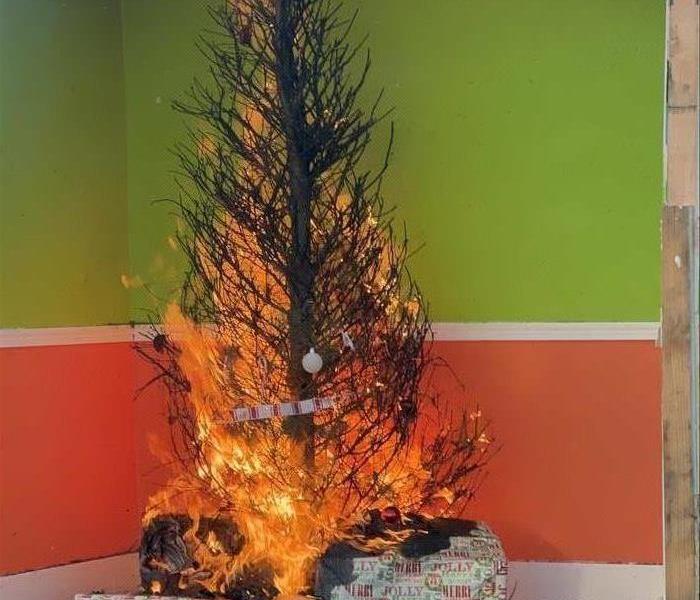 Our tree burned down in 9 minutes!
Our tree burned down in 9 minutes!
It only takes 10 minutes for an electrical spark to turn into a Christmas tree fire and devastate an entire room. That's less than than it typically takes for the fire department to arrive to your home and start putting out a fire. So here are some tips for having a live tree in your home.
1. Make sure to check every day that the tree stand is full of water. If it dries out, the base of the tree will harden and wont absorb enough water for the tree to stay health. Water the tree every day.
2. Keep all candles away from the tree. Candles are the number one cause of holiday fires, not trees, but having a live tree in your home increases the chances of a fire spreading quickly.
3. Keep the tree away from fireplaces and heat sources. It looks beautiful to have your tree next to the fireplace, but it's also the most dangerous. Sparks can jump. The tree is safer if it's more than 10 feet away.
4. Check your lights every year to make sure the wires haven't been broken or chewed through.
5. Remember that any cloth around the tree will catch fire just as fast as the tree, so try not to put it near curtains or blankets.
6. Always have a full sized fire extinguisher and working smoke detectors, so you can stop the fire before it gets out of control.
If you follow these steps, you're setting yourself up for a very merry Christmas!
Shed Fire in Island Park
9/22/2022 (Permalink)
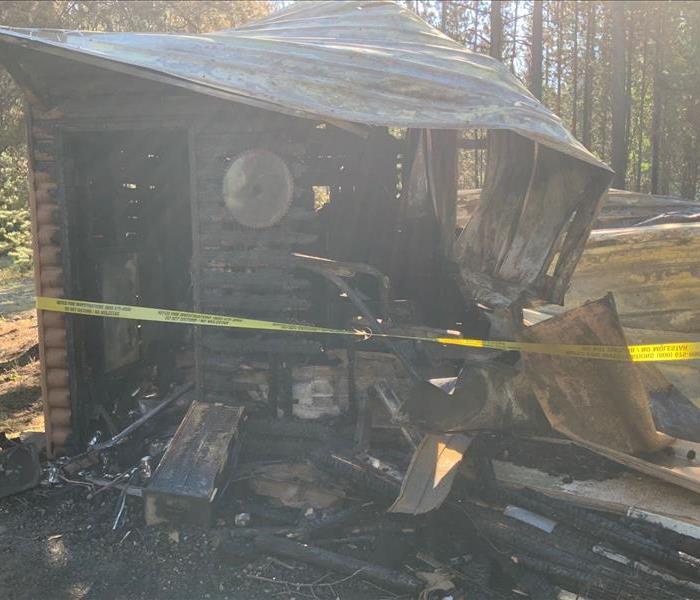 What we arrived to find
What we arrived to find
Recently, we got a call to clean up a fire in Island Park. A gentlemen who did woodworking lost his shed to a very hot, very fast fire, but was able to stop it from spreading into the surrounding forest.
SERVPRO of Blackfoot & Pocatello was able to get to the fire on the same day that it was cleared by the Fire Inspector, and we had it demoed and completely cleaned up in just three days! It's a record for our team. It was easy getting the job done with a homeowner who was communicative, and also trusted that we know what was best for safety and clean up.
We know it's not easy to lose your belongings in a fire. It's devastating. But SERVPRO of Blackfoot & Pocatello is here for you every step of the way.
We want to thank the family in Island Park for allowing us to share pictures of their loss.
How do we deal with a total fire loss?
9/22/2022 (Permalink)
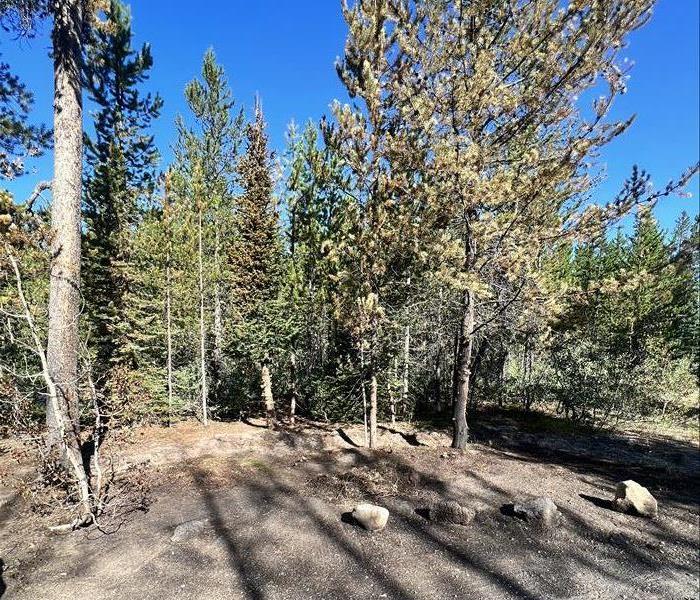 There use to be a shed in the middle of this picture.
There use to be a shed in the middle of this picture.
One of the questions we get is "What do you do if the house isn't restorable?"
That's an excellent question! We do demolition too. Our highly trained crew is able to help you obtain everything that is salvageable, we will help you clean up anything that has smoke and soot damage, and we will help you document everything that was lost.
We do test all necessary materials for lead and asbestos removal, since you cannot demo a house that is still in need of abatement. If the lead and asbestos tests are positive, we will properly remove all material before we proceed.
Then we will demo and remove all debris appropriately, and make sure there is nothing left for you to do but start rebuilding.
We know losing your home, business, or property to a fire is devastating. SERVPRO of Blackfoot & Pocatello is the company that will show up and help you step by step to make sure that you can start rebuilding quickly.
You can put out a fire, but the smoke will linger.
5/17/2022 (Permalink)
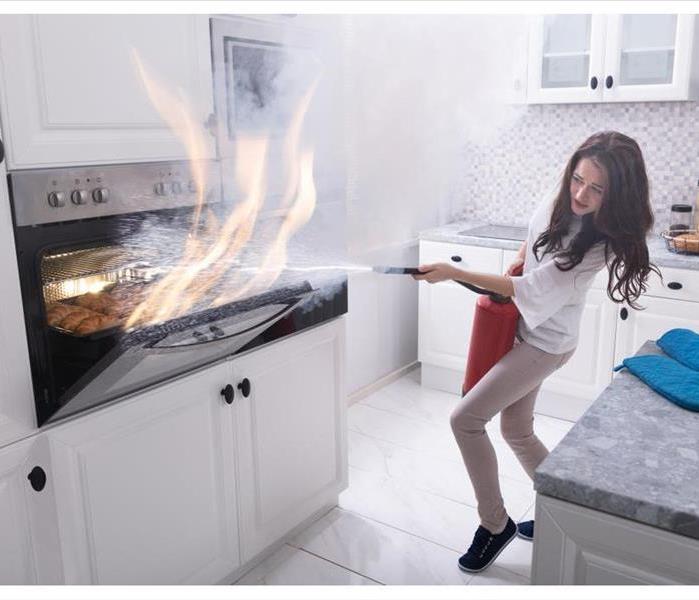 You can handle the fire, but can you handle the smoke?
You can handle the fire, but can you handle the smoke?
"It wasn't very big, and we got the fire out ourselves, but it still smells."
We get this call a lot. Someone has a fire in their home, but it was handled before anyone had to call the fire department, but two days later your house still smells like burnt ramen and campfire.
No matter how small the fire, smoke and soot will still penetrate in your home and leave a residue that is likely to cause lingering smells that won’t disappear. No amount of Febreze or candles will help.
SERVPRO of Blackfoot/Pocatello is here to help! We have the experience and the products that will clean your walls and furniture and help you get your home smelling fresh and clean again. Our mitigation experts know exactly where those smells are lingering and how to get them out.
No matter if it was a grease fire, wood fire, chemical fire, or your kid burnt his top ramen on the stove, we can help!
Call us today, and we'll be there in an hour! (208) 242-3819
How To Clean Smoke Stains
3/28/2022 (Permalink)
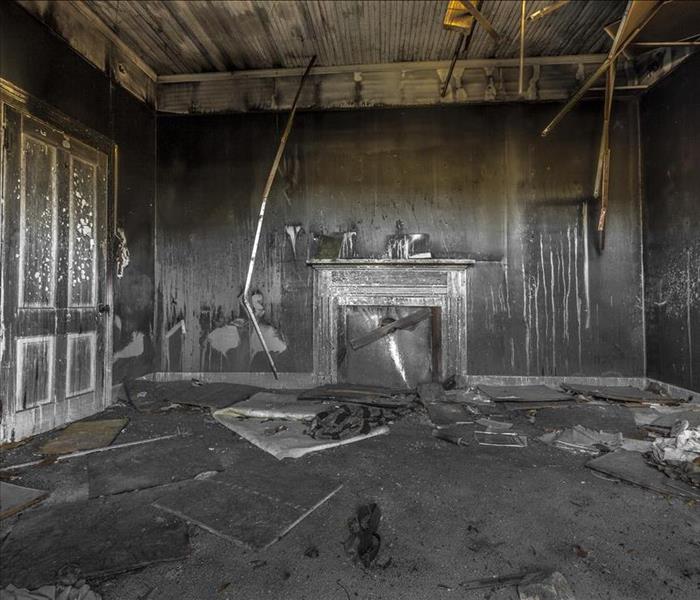 No job is too big for SERVPRO
No job is too big for SERVPRO
Smoke stains can be caused by several different mishaps around the home. A fireplace, candle, BBQ, heater, or even a small fire can create an ugly smoke stain. The worst being nicotine stains from cigarette smoke. Most people don't realize that smoke stains are oil based, and require a lot more than just a good scrubbing to clean up.
Smoke particles themselves are called soot, and that is the grey or black stains that can be powdery or oily that also coat the surfaces of a home exposed to a fire or smoke. They don't just look bad, but they're really bad for your health too. They can get into your lungs and bloodstream and make people really sick. That's why is so important to make sure that all smoke stains are cleaned properly.
Many of the cleaners that are designed for smoke and soot are extremely harsh on your lungs and skin, so always make sure that if you're going to try and do it yourself that you wear the proper safety equipment like gloves and a mask. Not all cleaners are created equal, and you have to make sure to remove the oil based smoke from the walls, or the stains will continue to reappear, even after you paint over them.
Directions for Removing Smoke Stains from Walls
- Remove the soot. Do this with a HEPA vacuum and don't scrub.
- Spray it with water to prevent it from going airborne.
- Apply Cleaner. Spray cleaner on all affected areas on brick, stone, metal or plastic. For painted surfaces, used a sponge.
- Scrub. Agitate the stained area with your brush or scrubbing pad.
- Rinse with water. Spray clean, warm water onto the cleaned area or wipe down with a damp towel.
- Dry. Allow to air dry, or wipe with dry towel.
Heavy soils may require repeated application.
If that process seems overwhelming, SERVPRO of Blackfoot/Pocatello are leading experts on smoke and soot removal, and we have the products to get the job done right, and quickly. Give us a call today and we can be there in an hour.
Smoke Detector Safety
1/26/2022 (Permalink)
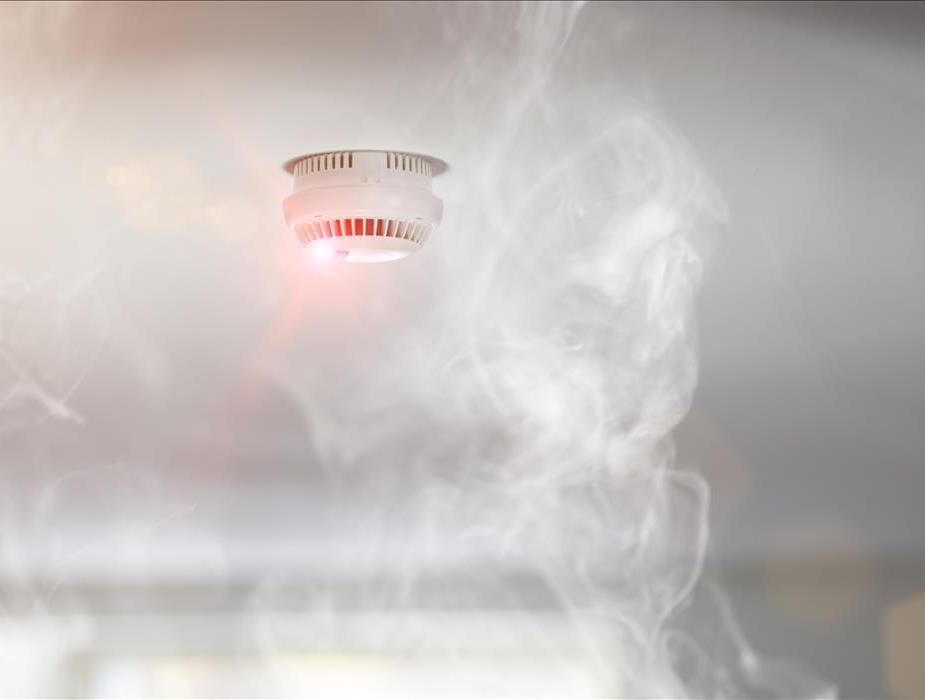 Make sure your smoke detectors are working.
Make sure your smoke detectors are working.
Install smoke alarms on every level of your home, and inside of every bedroom, and outside of every sleeping area.
Have a fire extinguisher on every level of your home, plus one in the kitchen and one in the garage.
Test smoke alarms every month. If they’re not working, change the batteries.
Talk with your family about an emergency fire escape plan, and practice it with them so they know how to get out of the house.
If a fire occurs in your home, GET OUT, STAY OUT and CALL FOR HELP. Never go back inside for anything or anyone.
Call SERVPRO of Blackfoot/Pocatello to clean up the mess. (208) 242-3819
Baseboard Heater Fires
1/7/2022 (Permalink)
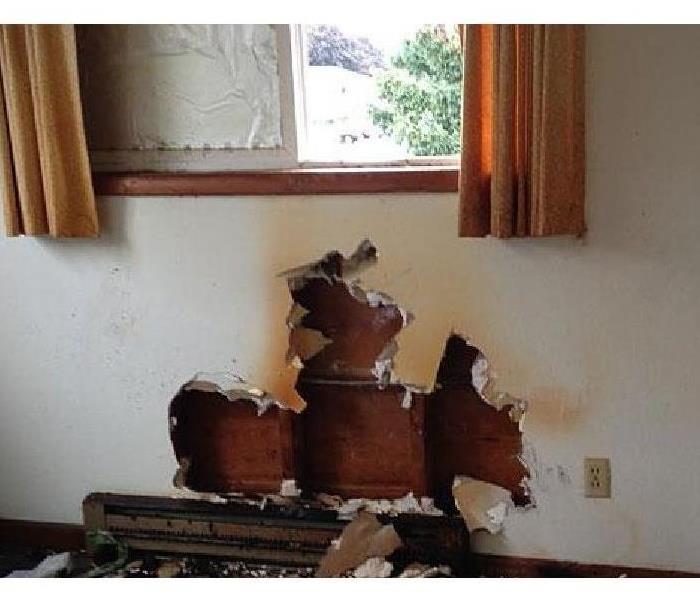 This apartment caught fire due to a mattress being placed too close to a baseboard heater.
This apartment caught fire due to a mattress being placed too close to a baseboard heater.
There are many things that can cause a house fire, but in the winter months, there are several high risk factors that need to be addressed to keep your home and your family safe during these cold winter months.
Baseboard heaters have been used for many decades now to heat homes, and aside from the cost of electricity, they're pretty good at what they do. The newer models have been designed well, and their heating elements are encased well, so that they don't post a high risk of fire. However, all heating elements, and the older baseboard heaters can do some real damage to a home if improperly used.
So why is it important to keep a clearing? Baseboard heaters that work with an electric coil get very hot. A hanging curtain, stuffed animal, or sock that might carelessly be left against one is a quick fire hazard. Then some heaters are installed UNDER electrical sockets, and that poses a risk of those electrical wires melting and starting an electrical fire of their own.
So when you stay warm this month, make sure you keep a nice distance between anything and your baseboard heaters. Pretend they're an open flame, and treat them as such.
And if you do happen to have a fire, don't hesitate to call us at SERVPRO of Blackfoot/Pocatello, and we can assist you in cleaning it up. 208.242.3819
Smoke in the Attic
12/6/2021 (Permalink)
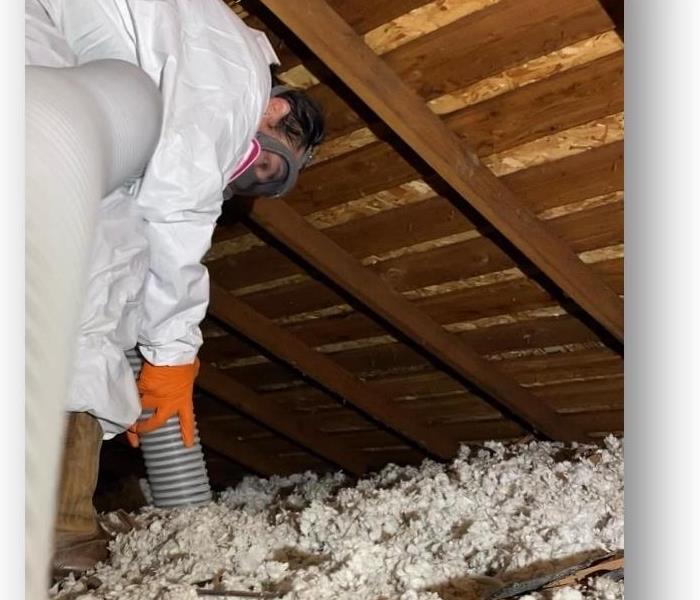 We have specialized tools to remove any insulation.
We have specialized tools to remove any insulation.
When you think about fire damage to a home, you think about the smoke, soot, and burned belongings that will need to be replace. There is also a very necessary step in almost any fire to restore your home like new, and that's removing the insulation.
When a fire spreads through a room, even if the location of the flames is small, that smoke rises into your attic, and will permeate your insulation. That's one of the few parts of your home that can not be cleaned, and the smell of smoke will stay in the home as long as the insulation isn't removed. No one wants a house that permanently smells like campfire, so the insulation will require replacement.
We at SERVPRO of Blackfoot/Pocatello do everything we can to make sure that your home feels like yours again. We know that a house fire can be devastating, and we want to make sure that you can walk back into your home without smelling a reminder of smoke every day.
So if you have a fire, keep in mind that insulation removal isn't just an option, it should be the standard.
Tis The Season.... For Fire
11/9/2021 (Permalink)
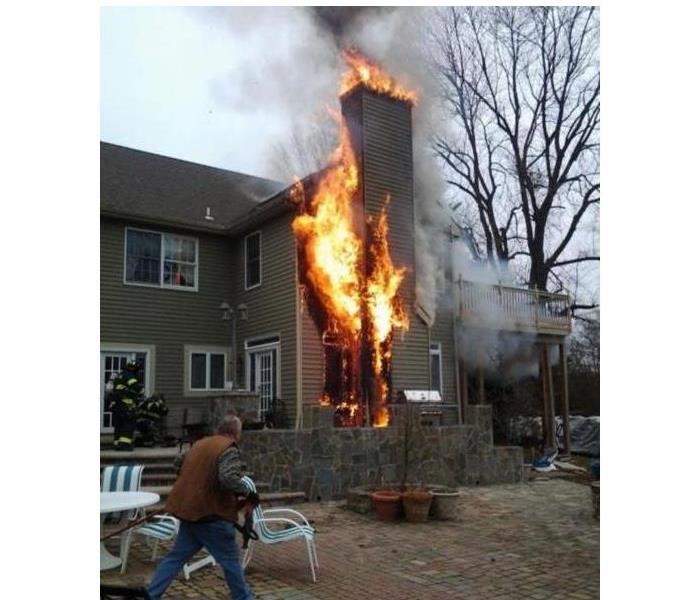 Not cleaning a chimney can cause devastation to a home.
Not cleaning a chimney can cause devastation to a home.
Whether it's chestnuts roasting, or a turkey deep frying, or a Christmas tree light popping, this is the time of the year when house fires become more prevalent. One of the most dangerous, is the fire that you don't always notice.
We get it, you want to embrace the holiday season and maybe have a cup of hot chocolate in front of the fireplace. We do too! But when was the last time that you had that chimney cleaned? Typically you should have it cleaned once a year, or when the soot or creosote is over 1/8th of an inch thick.
So how do you identify a chimney fire? Often times you wont notice, but there are some telltale signs that you can look out for.
First of all, if you experience any of the following, immediately leave the home and call 911.
- A loud, crackling or popping noise from the chimney flue (imagine the sound of a large bonfire)
- A lot of dense, thick smoke coming into the fireplace or out of the top of the chimney
- Flames or things that are on fire (pieces of flaming creosote) coming from the top of the chimney
- A strong, intensely hot smell
- A roaring sound, often described as being like a freight train or airplane
Signs that you may have had a fire, and need to get it inspected
These signs may indicate that your chimney has experienced a slow-burning chimney fire:
- Fluffy, gray, “ashy”, or “honeycombed” creosote (normally, creosote is a flat, black, often shiny substance)
- Warped or discolored (“annealed”) metal components — this indicates the metal structures have been damaged by intense heat
- Cracked or damaged flue tiles, or chunks missing from flue tiles (this can also be caused by water damage)
- Heat-damaged roof structures (such as television antennas, shingles, or vents) near the chimney
- Creosote chunks or pieces found outside the chimney, on the roof or ground, or in the fireplace (intense heat can drive these from the chimney)
- Cracks in the exterior masonry of the chimney (caused by intense heat from inside)
- Evidence of smoke escaping through the sides of the chimney (indicates cracks inside the chimney flue, possibly caused by heat)
SERVPRO of Blackfoot/Pocatello can assist you with cleaning up after a chimney fire, from the soot on the wall, stone, or rocks, to bringing in equipment to clean the air so it doesn't smell like a campfire. Give us a call at (208) 242-3819 and we will help you stay cozy all winter long.
Steps To Take After A House Fire
9/27/2021 (Permalink)
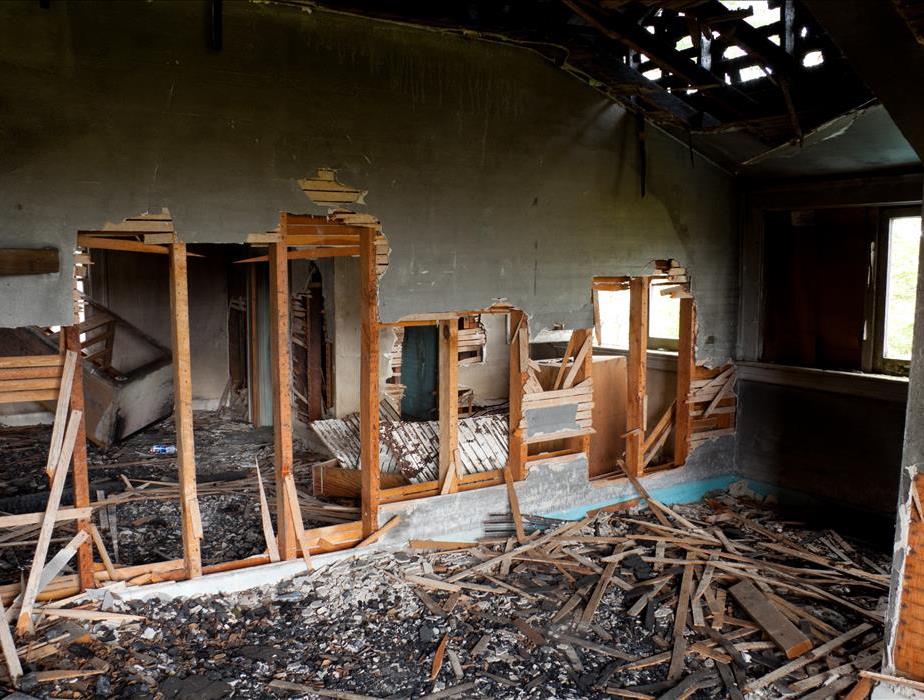 Detail images from a home that was abandoned after a large housefire. Your home doesn't have to end up like this.
Detail images from a home that was abandoned after a large housefire. Your home doesn't have to end up like this.
So you've had a fire. It happens, more often than most people realize. Some fires are small and just need some walls scrubbed and the air purified. If the fire department was contacted, there may be water damage along with the smoke and soot.
So what do you do now?
First, immediately contact the Red Cross if you are in need of any items to get by in the next few days, including clothes, food, or housing.
1-800-733-2767
If you have insurance, contact your insurance company. Let them know the extent of the damage you can see, and ask if you should file a claim. Very small fires may not cost as much as your deductible, so make sure to contact your agent right away. Once you're contacted your agent, it's time to reach out to the professionals.
Contact SERVPRO of Blackfoot/Pocatello to set up a time to assess the damage and start the mitigation process. Soot and smoke need to be cleared out of the air as quickly as possible, and water needs to be removed and stopped from spreading and causing more damage.
If you are not insured, try contacting community groups for aid and assistance.
Check with the fire department to make sure that your home is safe to enter. Be very careful when you go inside. Floors and walls may not be as safe as they look. Do not bring pets into the home until the air is breathable.
Contact your landlord or mortgage company to report the fire.
Try to find valuable documents and records.
If you leave your home, call the local police department to let them know the site will be vacant.
Begin saving receipts for any money that you spend related to the fire loss. The receipts may be needed later by the insurance company and to prove any losses claimed on your income tax.
Check with an accountant or the IRS about special benefits for people recovering from fire loss
You can also contact the Salvation Army for assistance. 1-800-728-7825
SERVPRO of Blackfoot/Pocatello is happy to assist you in any way we can in these difficult times. Please reach out to us at 208-242-3819 as soon as possible, and we will be there to help.
Preparing Your Home to Survive a Wildfire
9/13/2021 (Permalink)
 Los Angeles, California / Los Angeles County - August 31 2009: Station Fire was the largest wildfire of the 2009 California wildfire season.
Los Angeles, California / Los Angeles County - August 31 2009: Station Fire was the largest wildfire of the 2009 California wildfire season.
Every year, wildfires burn across the U.S., and more and more people are living where wildfires are a real risk. By working together, residents can make their own property - and their neighborhood - much safer from wildfire.
Wildfire risk reduction safety tips
Before a wildfire threatens your area…
In and around your home
- Clear leaves and other debris from gutters, eaves, porches and decks. This prevents embers from igniting your home.
- Remove dead vegetation and other items from under your deck or porch, and within 10 feet of the house.
- Screen or box-in areas below patios and decks with wire mesh to prevent debris and combustible materials from accumulating.
- Remove flammable materials (firewood stacks, propane tanks) within 30 feet of your home’s foundation and outbuildings, including garages and sheds. If it can catch fire, don’t let it touch your house, deck or porch.
- Wildfire can spread to tree tops. Prune trees so the lowest branches are 6 to 10 feet from the ground.
- Keep your lawn hydrated and maintained. If it is brown, cut it down to reduce fire intensity. Dry grass and shrubs are fuel for wildfire.
- Don’t let debris and lawn cuttings linger. Dispose of these items quickly to reduce fuel for fire.
- Inspect shingles or roof tiles. Replace or repair those that are loose or missing to prevent ember penetration.
- Cover exterior attic vents with metal wire mesh no larger than 1/8 inch to prevent sparks from entering the home.
- Enclose under-eave and soffit vents or screens with metal mesh to prevent ember entry.
You can't predict a wildfire, but you can do your part to keep your home safe. SERVPRO of Blackfoot/Pocatello is here to help you prepare for any disaster by creating an EMERGENCY READY PROFILE for your home or business. Call now (208) 242-3819 to schedule your free profile.
3 Tips for Safer Cooking at Home
5/25/2021 (Permalink)
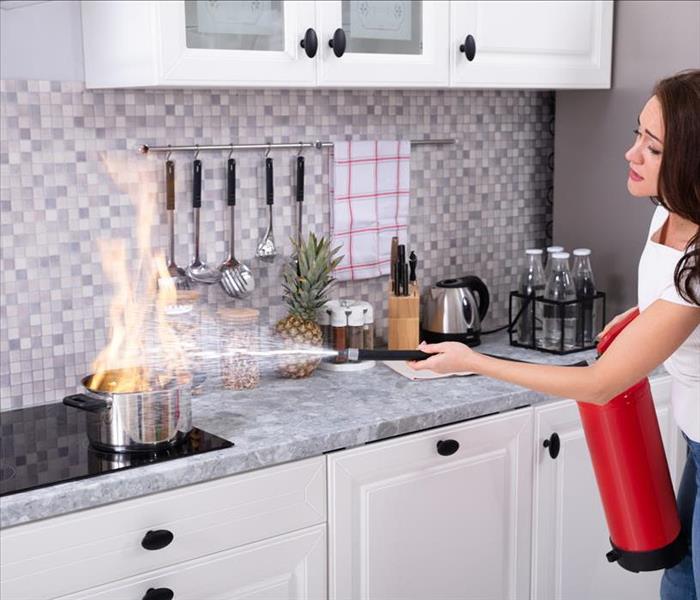 Cooking fires can be dangerous.
Cooking fires can be dangerous.
People often refer to the kitchen as the heart of the home because it is where you tend to gather, cook, and share meals. Unfortunately, the kitchen is often the location of many residential fires. While you can call the local fire department or a fire restoration service in Blackfoot, ID, there are a few essential tips you can follow to reduce your risk of a house fire due to cooking.
Reduce Cooking Fire
1. Stay In the Kitchen
One of the leading causes of fire damage from a kitchen fire is neglect. People tend to walk away from ovens and stovetops. You should not leave the kitchen unattended when cooking anything. There is no telling what can happen when you are away. If you know you will not be able to stay and watch the stove, turn it off. You can always return to cooking later. You might also choose to postpone your meal plans until the cooking process can have your full attention.
2. Maintain a Clean Area
Outside of the numerous other tips people might suggest, maintaining a clean area is among the most important. It is too easy to place boxes or containers on a stove while you are cooking. You do not want flammable items near the heating surface. Instead, focus on preparing for recipes before beginning to cook. Measure out all substances beforehand and place them in heat-resistant cookware or containers.
3. Install Fire Extinguishers
Stove and oven fires often result in a grease fire. You cannot use just anything to put out a grease fire. To ensure your safety, install a class B fire extinguisher in your kitchen near the cooktop. Class B extinguishers are designed to combat oil and grease fires.
While these tips are not extensive, they do provide a decent overview of fundamental safety precautions to take while cooking. For more information, you can speak to a local fire department representative.
Grill Fires
4/22/2021 (Permalink)
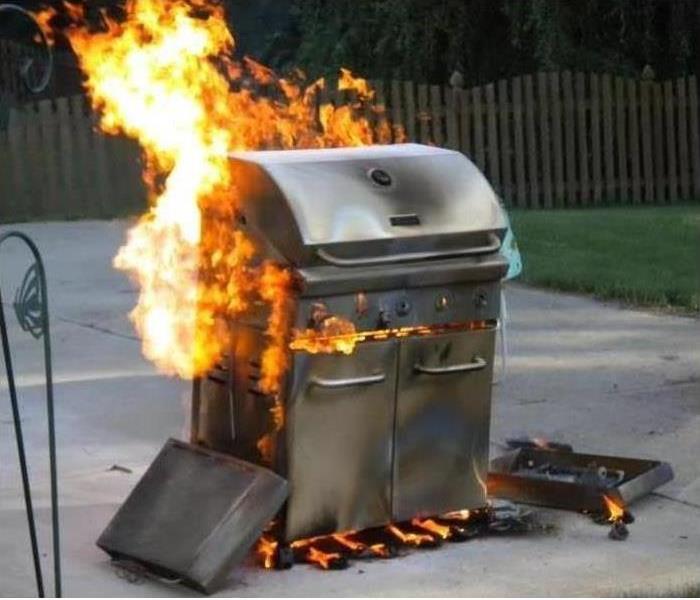 Grill fires can be avoided.
Grill fires can be avoided.
Grill fires can happen when your grill hasn’t been cleaned properly or frequently enough. All fires need three types of sources: heat, fuel, and oxygen. Just removing one of those elements a fire cannot exist.
6 Ways to avoid Grill Fires:
- Clean the fire box area around the burners
- Keep a distance from covered places, porch, patio, or balcony.
- Keep the grill outside the house.
- Always watch your grill and don’t abandon it.
- Inspect the propane tank for tiny holes or loosened hoses that might cause a gas leak.
- Delay cleaning up and give the grill time to cool down.
Steps in case of a grease fire:
- Turn off gas
- Leave lid open
- NEVER use water
- Use a fire extinguisher
- Call 911 if fire is still not out
About SERVPRO of Blackfoot/Pocatello
SERVPRO™ of Blackfoot/Pocatello specializes in the cleanup and restoration of residential and commercial property after a fire, smoke or water damage event. Our staff is highly trained in property damage restoration. From initial and ongoing training at SERVPRO’s corporate training facility to regular IICRC-industry certification, rest assured our staff is equipped with the knowledge to restore your property
Why Replace Working Batteries in Your Smoke Alarms
2/23/2021 (Permalink)
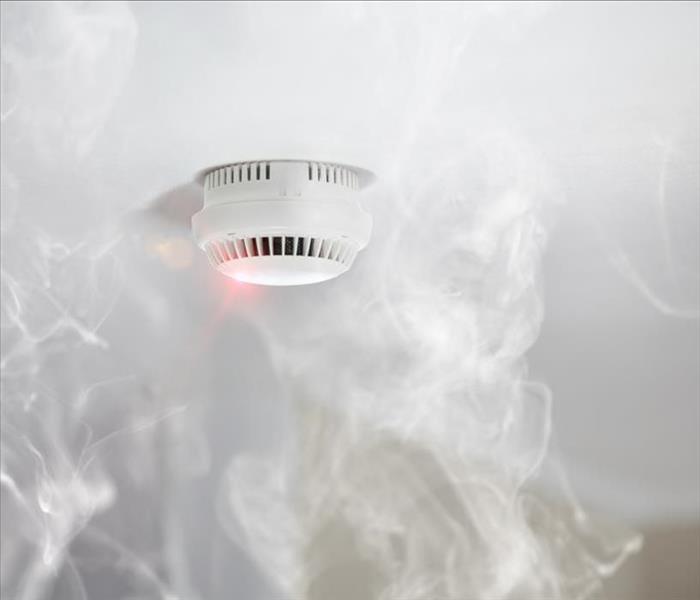 Replace the batteries of your smoke detector.
Replace the batteries of your smoke detector.
Every smoke alarm that you have installed in your home is there to keep you, your family, and your home safe from fire damage. Sadly, a lot of alarms are installed and then mostly forgotten about. Even the very best alarms won't do any good unless the batteries inside are replaced regularly. In fact, there are a few specific steps you should take to keep your home safe:
- Test each alarm in your home at least once a month.
- Change the batteries in all of your alarms twice a year. One good rule of thumb is to change them when you change your time for Daylight Savings.
- Improve your fire evacuation plan, making adjustments for family changes.
- Place fire extinguishers and other safety products in your home as necessary.
These steps can go a long way toward keeping your family safe in the event of a fire.
Why Replace Old Batteries?
Most experts, including the National Fire Protection Association recommend changing your batteries twice a year or every six months. Today, there are many batteries that last longer far longer than six months. Do you still need to replace those batteries? The main thing to remember is that you've installed the smoke detector to protect your family from a house fire. Rather than trying to make your batteries last as long as possible, swap them out every six months and put the older batteries to use in something that you use for fun rather than for safety.
What Good Is the Alarm?
Home fires sometimes happen where you don't see them right away. In the event that a fire breaks out in your home, a working smoke detector may provide the valuable seconds necessary to safely evacuate your family. Under the right circumstances, the alarm may give you time to put the flames out before major damage happens.
When it comes to home and family safety, the smoke alarm may be one of the most important devices in your home. Once you've taken steps to keep your family safely out of harm's way, water and fire damage cleanup and repair professionals can help you get back into your Pocatello, ID, home.
How to prevent house fires
1/18/2021 (Permalink)
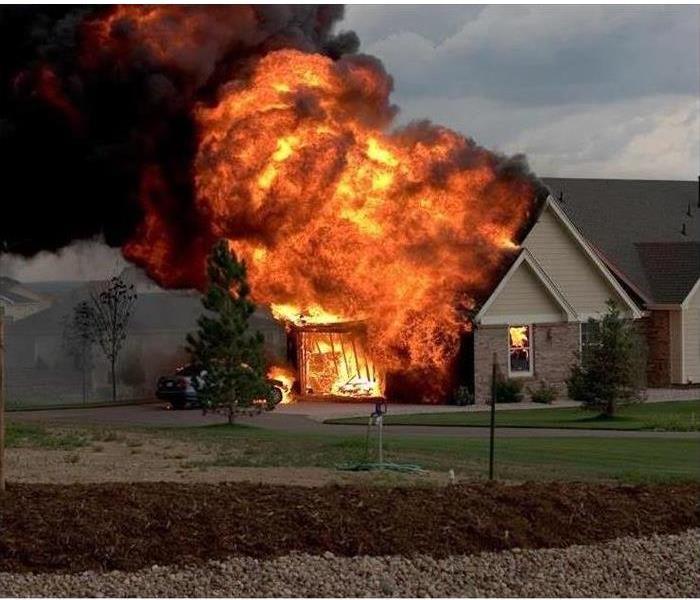 Avoid residential fire damage.
Avoid residential fire damage.
Avoiding a home fire in Pocatello, ID, is always at the top of the list. Keep your home safe from fire damage by being aware of the top to fire hazards in your home.
Top 10 Fire Hazards
- Cooking equipment: Over heated pots and pans can splatter grease when cooking. When cooking stay in the kitchen while cooking to insure this doesn’t happen.
- Heating: Have a furnace inspection annually by a technician and keep items away from heating sources.
- Smoking in bedrooms: Make your home or bedrooms off limits for smoking. If you become drowsy while smoking it is easy to fall asleep.
- Electrical Equipment: Check electrical cords for fraying, don’t overload your outlets, don’t run wires under rugs, and don’t over use extension cords.
- Candles: Keep candles on a level surface and out of reach of children and pets. Don’t leave candles lit when leaving a room or house.
- Curious Children: Keep matches away from children.
- Faulty Wiring: older homes and apartments had different building codes when they were built. Have your wiring inspected to see if needs to be updated.
- Barbecues: clean regularly by removing parts and clean with soap and water. Also check for propane leaks.
- Flammable Liquids: Make sure that these types of liquid are kept in a place away from heat sources.
- Lighting: This is a major issue around Christmas time, keep tree stand full of water and keep tree away from heat source.
About SERVPRO of Blackfoot/Pocatello
SERVPRO™ of Blackfoot/Pocatello specializes in the cleanup and restoration of residential and commercial property after a fire, smoke or water damage event. Our staff is highly trained in property damage restoration. From initial and ongoing training at SERVPRO’s corporate training facility to regular IICRC-industry certification, rest assured our staff is equipped with the knowledge to restore your property
3 Tips for Cleaning Your Gas Range
12/28/2020 (Permalink)
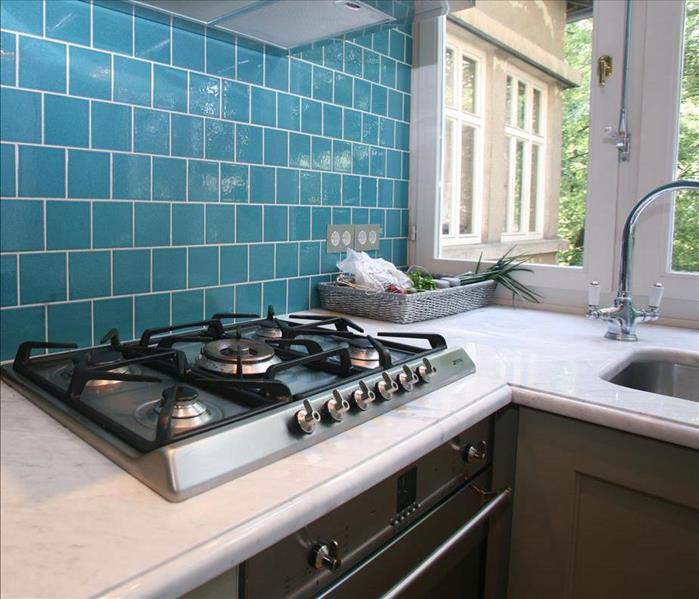 Follow these tips to clean up your gas range.
Follow these tips to clean up your gas range.
If you've ever had a pot boil over, you know that stovetop messes can be a real hassle to clean. Liquids and debris can seep into the areas below the surface and spills can quickly become baked on by the heat from the burners. These three tips can make cleaning your gas range easier.
3 Tips That Can Make Cleaning Your Gas Range Easier.
1. Use Baking Soda to Clean Your Grates
Spills and other debris from cooking tends to build up on your stove grates. Over time, this debris can form a thick layer of gunk that is difficult to remove. However, you can make your range cleaning easier by soaking the grates in hot soapy water and then applying a baking soda paste.
To make the paste, mix baking soda with a small amount of water. Spread a layer of the paste onto your grates and leave it on for about 20 minutes. When the 20 minutes is up, use a sponge to clean the grates.
2. Unclog Your Fuel Ports
Remove the grates and burner caps from your gas range. The fuel ports are small holes under the burner caps where the gas comes out when you light your stove. Food debris can fall into the ports and clog them, causing uneven heating or making it difficult to light the stove. Use a small object, such as an unbent paperclip, to clear debris from the ports.
3. Clean as You Go
The best way to avoid the smoke smell and tough to clean messes is to clean as you go. If you wipe up messes right away, they are less likely to get baked onto the stove or smoke up your kitchen. However, if your kitchen already has a smoke smell that just won't go away, consider contacting a professional cleaning service in Pocatello, ID, to remove the odor.
A messy gas range can be a real chore to clean. These three tips will make the process easier.
How To Prepare Your Hotel for a Fire
10/20/2020 (Permalink)
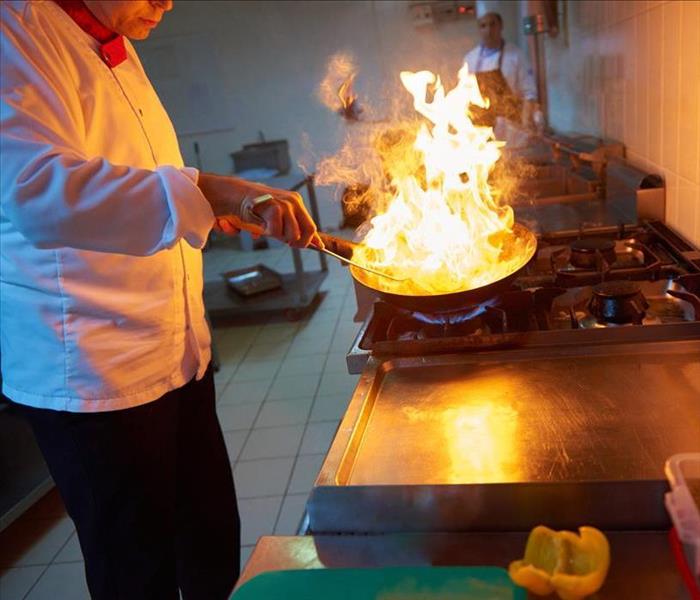 Avoid grease fire damage
Avoid grease fire damage
A hotel fire probably isn’t on the day’s itinerary, but if you’re a hotel manager, you need to know to handle the unexpected. That includes a fire in a guest room or other location on your Pocatello, ID, property. Follow these three fire prevention tips to make sure you and your staff are ready in the event of a fire.
3 Tips To Prevent Fire Damage
1. Identify High-Risk Areas
Perform a walk-through of the property and look for hazards such as damaged appliances in kitchen areas or break rooms, faulty wiring and damaged outlets. As you perform your assessment, pay special attention to how guests with different mobility needs would exit in the event of a fire.
2. Evaluate Existing Fire Safety Measures
In addition to assessing high-risk areas of your hotel, you should also inspect the fire safety elements that are already in place, such as smoke detectors, fire alarms, fire extinguishers and sprinkler systems. Exit routes should be clearly labeled and posted around your entire hotel, including in each guest room, and these paths should be bolstered with functioning lighting and signage. These fire safety implements should be tested regularly to ensure that they work correctly in the event of a hotel fire. All exit routes should be kept free from debris and other obstacles as well.
3. Create a Fire Prevention Task Force
Appointing fire wardens makes it easy to delegate tasks, communicate and ensure that all bases are covered if a blaze breaks out. Assign duties and train staff members to carry out essential fire safety tasks such as operating fire extinguishers, leading guests to safety and contacting a fire restoration company.
Part of being a hotel manager is anticipating every scenario that guests and staff can throw your way. Preparing your property for a hotel fire is just one way to continue providing guest service excellence while maintaining a safe, secure workplace for your team.
The 4 Step Fire Remediation Process
9/14/2020 (Permalink)
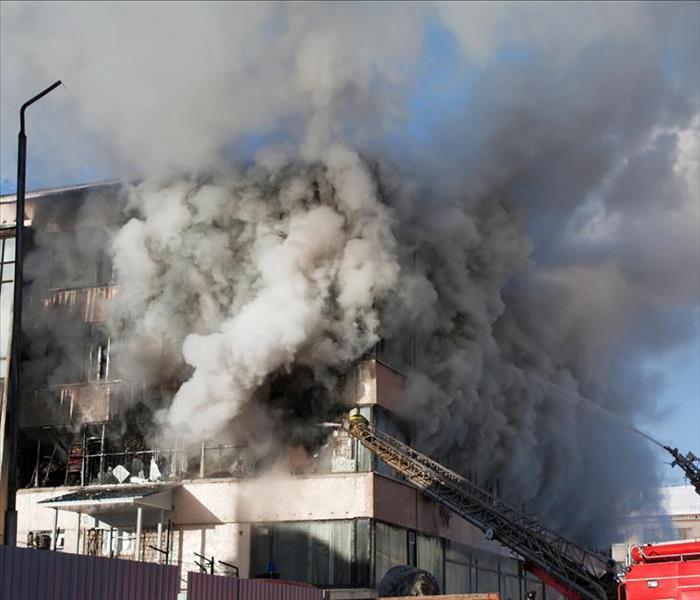 Commercial fire damage can be devastating.
Commercial fire damage can be devastating.
Dealing with fire damage to your commercial property is devastating, and without business interruption insurance, it is even more challenging. However, that does not mean that all hope is lost. A fire remediation company in Pocatello, ID, can help you recover and move on from the damage. Before reopening your business, you will need to address the issue of smoke damage and soot damage through the restoration and remediation process. Most mitigation companies follow a necessary four-step process.
- Water Removal
- Debris removal
- Structural Analysis
- Restoration
4 Steps Most Mitigation Companies Follow For Fire Remediation
1. Water Removal
Many people fail to acknowledge the level of water damage that can occur during a fire. Whether suppression from sprinkler systems or flooding caused by the use of fire hoses, your building will likely have extensive pooling. A restoration service will address the issue by using pumps, shop vacs and other tools to move the excess water. They will also use dehumidifiers to remove moisture in the air and building materials.
2. Debris Removal
When the facility is dry, the company will get to work removing any debris. Some examples of waste may include equipment, furniture, carpeting, drywall and ceiling tiles. The restoration crew will also perform fire and smoke cleaning as they prepare for the restoration phase.
3. Structural Analysis
Before the team moves onto the restoration phase of the project, they will need to make sure that the facility can handle the repair. Sometimes, A fire affects the structural integrity of the building, and the only thing left to do is remove sections of the structure. Depending on the level of fire, water and smoke damage to your building, a team may need to restructure some elements.
4. Restoration
Finally, the crew will rebuild your facility. The objective is to return the property to pre-disaster conditions. The final stage may take only a few days or multiple weeks.
If your company experienced a fire, then consider reaching out to a restoration company for assistance. Regardless of your insurance coverage, you will need help returning to normal after the fire and smoke damage.
Fundamentals of Furnace Maintenance
8/26/2020 (Permalink)
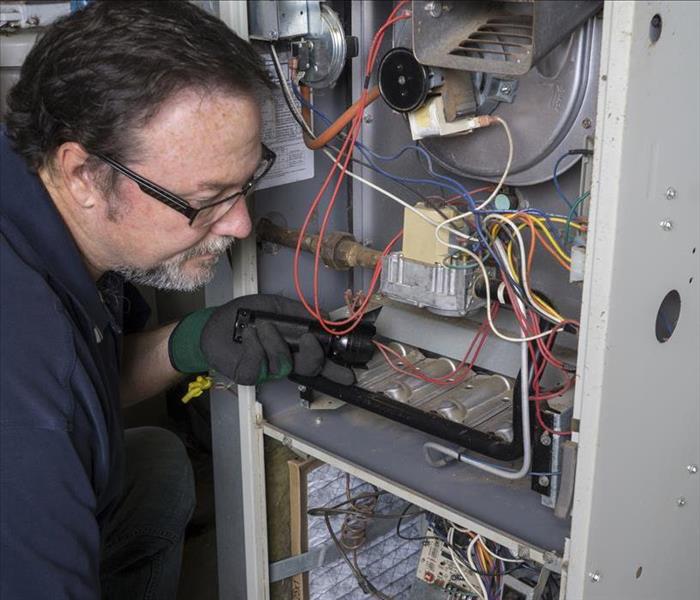 Furnace maintenance is important
Furnace maintenance is important
Any remediation company in Blackfoot, ID, will explain that many fire cleaning and mitigation projects stem from a faulty or poorly maintained home furnace. While no professional expects homeowners to handle the maintenance of these essential appliances alone, it is crucial that upkeep remains a priority. There are at least four tasks when performing routine maintenance.
- Change filters
- Clean flame sensor
- Remove and clean the blower
- Inspect the drive belt
4 Steps To Follow When Performing A Routine Furnace Maintenance.
1. Change Filters
Most smoke cleaning professionals will explain the value of correct filter maintenance. Air filters ensure that your family is breathing healthy air. A typical filter will only last between one and three months, depending on system use. The filter not only prevents contaminants from recirculating through your home, but it also prevents those same particles from damaging your furnace's motor and blower.
2. Clean Flame Sensor
You may also want to check the thermocouple to ensure that it is clean and free of debris. The thermocouple or flame sensor is the device that tells the furnace the pilot is or is not working. If the sensor is covered in dust, it may produce a false negative, which can lead to damage. Us a drinking straw to gently blow dust free of the sensor.
3. Remove and Clean the Blower
A dirty blower can cause all sorts of problems, including fire. To prevent the need for fire cleaning, remove the blower, and clean it thoroughly.
4. Inspect the Drive Belt
The drive belt is responsible for the function of the motor. You want to check the belt regularly to ensure it is free of cracks and frayed areas. If the belt fails, it can lead to overheating.
Any fire cleaning specialist will tell you that furnace maintenance is necessary. While it is possible to perform the tasks alone, you are often better served by contacting a local remediation company or HVAC repair service for help.
Smoke and Fire Damage Services
7/16/2020 (Permalink)
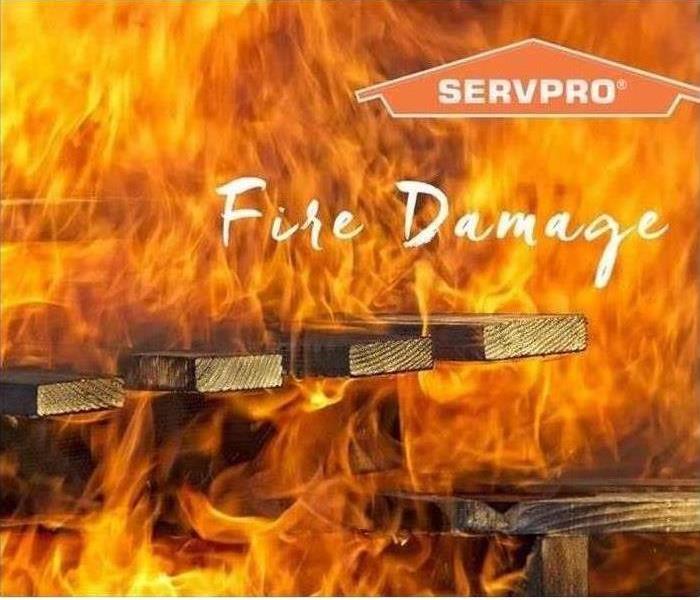 Fire damage can be devastating. We can help!
Fire damage can be devastating. We can help!
Fire damages could be the most devastating incident you can ever experience. Being a stressful time for you, we believe that all you need is a professional restoration company to help you along the way.
SERVPRO of Blackfoot/Pocatello has trained team members to meet any of your needs. We have the state of the art equipment to rebuild your home or business.
SERVPRO of Blackfoot/Pocatello's restoration process.
Includes:
- Emergency Contact
- Inspection of the related incident
- Fire Damage Assessment
- Board and Roof tarp services (if any)
- In cases where water damage has been experienced, we provide water removal and drying services
- Cleaning off smoke and soot off all affected surfaces
- Overall cleaning and repair services
- We are IICRC Certified
Why you should pick us:
- We've always cared for our client's property like our own.
- We are open 24/7
- We act quick to any disaster and are to your property within one hour receiving the call.
- We are equipped to deal with any size of fire damage
- We are specialized in fire and water-related damages; hence we assure you the most reliable and quality services
- Our team member technicians are qualified to answer your questions and put your concerns to rest.
The most Common types of Smoke Damage.
7/15/2020 (Permalink)
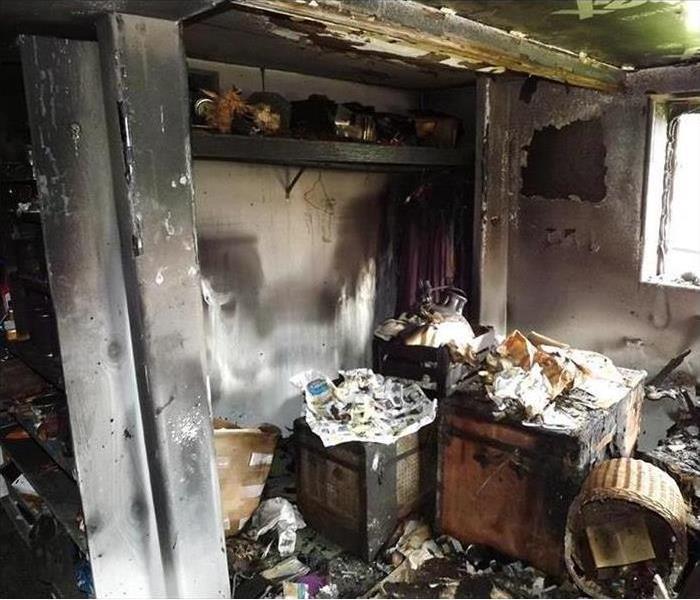 Severe smoke and soot damage.
Severe smoke and soot damage.
When you are at work and get a phone call that the fire department is at your home. When you decide to fry some chicken for dinner and it quickly turns into a grease fire. Or you wake up in the middle of the night and see that your room is filled with smoke. These are all situations that are not only tariffing but also life changing. This is something sadly that at SERVPRO of Blackfoot/Pocatello we see frequently. One of the most invasive aspects of a fire are smoke and soot. Which can penetrate various cavities within your home, causing hidden damage and odor. Our smoke damage experience allows us to inspect and accurately assess the extent of the damage to develop a plan of action.
2 Types of Smoke Damage
There are two different types of smoke–wet and dry. As a result, there are different types of soot residue after a fire. To determine which type of smoke has occurred a soot test will be performed. This will identify the correct cleaning procedure that our experienced team will follow.
Some facts regarding smoke and soot:
- Hot smoke migrates to cooler areas and upper levels of a structure.
- Smoke flows around plumbing systems, seeping through the holes used by pipes to go from floor to floor.
- The type of smoke may greatly affect the restoration process.
1. Wet Smoke – Plastic and Rubber
Low heat, smoldering, pungent odor, sticky, smeary. Smoke webs are more difficult to clean.
2. Dry Smoke – Paper and Wood
Fast burning, high temperatures, heat rises therefore smoke rises.
Protein Fire Residue – Produced by evaporation of material rather than from a fire
Virtually invisible, discolors paints and varnishes, extreme pungent odor.
Did you know there are different kinds of smoke?
7/13/2020 (Permalink)
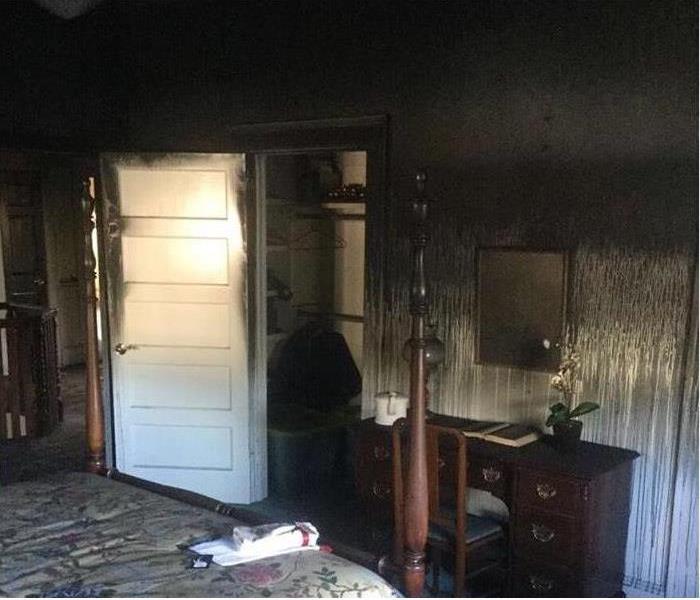 This room suffered severe smoke and soot damage.
This room suffered severe smoke and soot damage.
Once we know what caused the fire we can start to decide on what equipment and cleaning materials to use in the effective areas.
3 Different Types of Smoke
The different types of smoke are below:
- Wet Smoke: happens when rubber and/or plastic burn. These types of fires burn at a lower temperature than other types of fires. Since the plastic/rubber burned it will leave behind an overpowering odor and will leave behind a pasty residue.
- Dry Smoke: occurs when papers and wood are burning. Paper and wood burn very quickly and at a high temperature. These types of fire will cause a lot of damage to the ceilings and even into attics.
- Soot smoke: this type is when there is a malfunction with the furnace and HVAC system. When this happens, it will put smoke throughout the home through vents. Before cleaning and repairs can happen, the furnace will need to be replaced or repaired. Then the vents in your home can be cleaned so that left over smoke does not continue to go through your home.
When you have fire and/or smoke damage in your home don’t worry about what kind of smoke is in your home, SERVPRO of Blackfoot/pocatello can do that for you and repair the damages. We understand how stressful any type of disaster is. Let us help you repair it.
Do's and Do Not's of a grease fire.
7/7/2020 (Permalink)
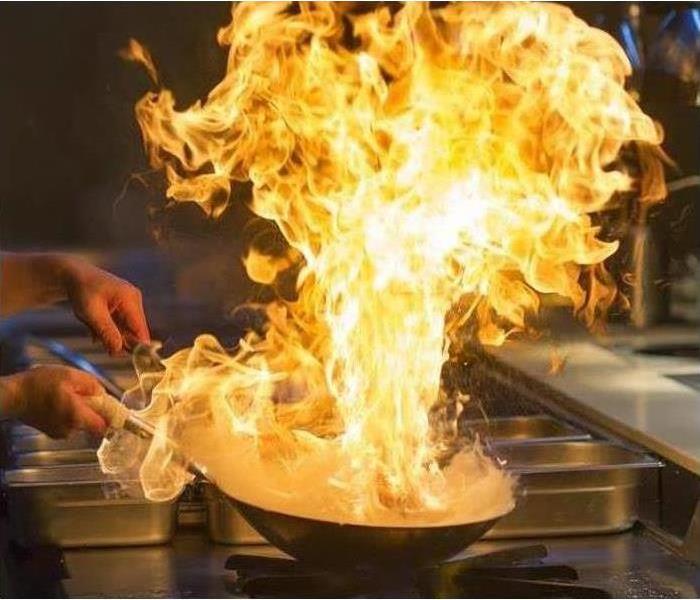 Grease fire can be devastating if not taken care of quickly.
Grease fire can be devastating if not taken care of quickly.
Sometimes cooking won’t goes as planned and you can accidentally start a grease fire in your kitchen. Here are a few things you can do if one starts in your home.
3 Things to Do When a Grease Fire Starts
- Turn off the source of heat, meaning turn off the burner as soon as possible.
- Cover the fire with another pot, metal lid, or cookie sheet. If you do not have another pot or lid, try putting baking soda or salt on top. Doing this will suffocate the fire because it will not have as much oxygen reaching it.
- If you feel unsafe, go outside to a safe location and call 911 or help.
Below are a few DO NOT’s while attending to a grease fire:
- Use water or any fabrics to put out a grease fire.
- Use baking powder. Might look the same as baking soda but the chemical make up is very different.
- Moving the pot that’s on fire.
We know your home will be an instinct to save. However, you and your family’s safety are the number one priority.
Fire Safety
7/6/2020 (Permalink)
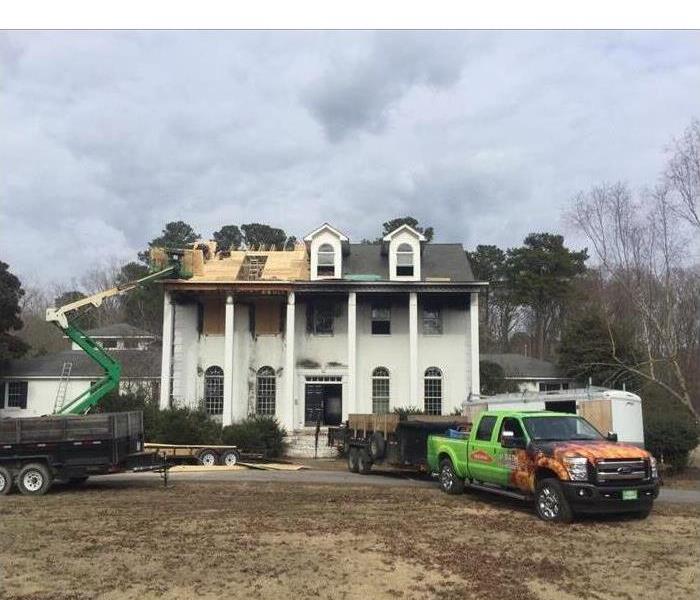 Parts of a roof being replaced after a home fire.
Parts of a roof being replaced after a home fire.
Many of us know our fire safety 101 in our homes. We know not to leave an open flame such as, a candle or gas stove stop unattended. Even though we may feel comfortable with our knowledge of fire safety, here are a few tips and reminders to follow in your Pocatello, ID, home.
Tips And Reminders For Fire Safety
- Have a fire extinguisher in your home. Fire extinguishers play a crucial role in protecting your home during the very early stages of fire.
- Avoid overloading your outlets or outlet extenders. They can easily over heat if they are being over used. Check on your outlets as often as you can. Make sure to replace any that may be getting worn out or old.
- When doing laundry, remember to empty lint tray from dryer on every use. When the lint is not cleaned it can cause the dryer to heat to a higher temperature. Therefore, the machine will have to work harder and also work at a lower efficiently.
- Check on space heaters. Make sure space heaters are at least 2-3 feet away from furniture, window treatments, bedding, clothing, rugs, and other combustibles. These items can cause a risk of fire if they come in contact with the unit.
- Check on smoke alarms. Check to see if smoke alarms are working every month and replace batteries twice a year.
Did you know that cooler weather can cause fires?
7/3/2020 (Permalink)
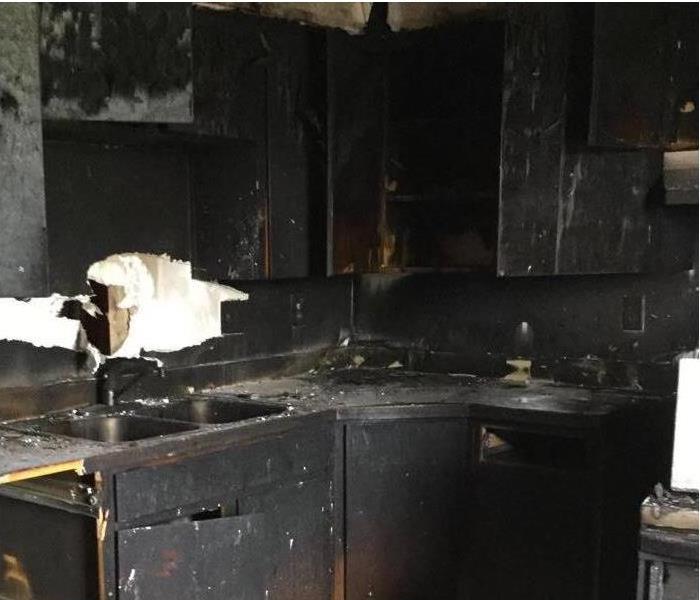 This home caught on fire and here is the aftermath of one room.
This home caught on fire and here is the aftermath of one room.
Even though we are in the middle of summer you never know what kind of weather Idaho has in store for us. As we approach the end of summer and begin the cooler months, fires increase in inside the homes. SERVPRO of Blackfoot/Pocatello recently helped a homeowner who left a bulbed Christmas candle in the window which caught a curtain on fire. Almost the entire house was damaged as result.
How to prevent fires at home
Most people know the basics of fire safety at home, such as not leaving burning candles unattended and keeping a fire extinguisher on hand. Here are a few more things you can do to prevent fires at home.
- Have your heating system serviced regularly by a professional, including chimneys from wood-burning fireplaces. Clean around heat sources and keep dust and other flammable items away from ignition sources.
- Remove the lint from your dryer filter after every use. A clogged filter and lint trap makes your dryer less efficient, reduces the airflow needed to keep heat from building up in the vents, and forces lint onto the heating coils. Also, never let your dryer run when you are out of the house or when you’re asleep.
- Keep firewood, piles of leaves and trash away from the home. If a grass fire starts nearby, these items next to your home could easily become kindling. Never dump hot ashes inside or near your home; keep them in a metal container well away from your house and garage.
- Avoid using outlet extenders or plug-in power bars: they can quickly overload an electrical circuit. Replace old, damaged or frayed appliance cords, and never force a three-pronged plug into a two-slot outlet or extension cord.
- Store containers of cooking oil well away from the stove. When cooking with oil, never leave the stove unattended. To stop a grease fire, turn off the burner and place a lid on the pan to suffocate the flames, or pour on lots of baking soda. Never pour water on a grease fire or try to carry the pan outside; water splatters the grease and makes the fire bigger, and the pan will be much too hot to carry.
- Consider using borrowed heat to keep outdoor pets warm. During winter months, avoid using heat lamps, solar lamps, trouble lights, heated watering bowls or other such heated devices, which could lead to a potential fire. Borrowed heat involves providing warmth from a heating system located in a separate building. If this isn’t possible, consider bringing your pets inside.
- Be sure to properly extinguish smoking materials. Smoking materials that are not properly extinguished can smolder undetected for days before igniting a fire. Never discard smoking materials on the ground or in plant pots.
Your Blackfoot/Pocatello Home
6/18/2019 (Permalink)
If a fire starts in your home you may have as little as two minutes to escape. A fire in your home can be devastating and weeks after are not easy. Below are a few tips on how to prevent fires in your home:
Electrical Outlets
- Don’t overload your circuits
- Only surge protectors will help prevent and protect your electronics from a power surge.
- If you feel your home is older, have it checked out by a professional and make sure your home is up to the new standard.
Kitchen Fires
- Never leave your kitchen unattended when you are cooking or when there are pots/pans on the stove.
- Keep flammable items away from stove top
- Its important to have a fire extinguisher on hand or near your kitchen.
Dryers
- Clean out the dryer vent regularly
- Clean underneath and behind your dryer to eliminate any lint that collects
- Clean out lint filter after each load!
Smoking Fires can be prevented in your home.
6/18/2019 (Permalink)
When we are home we feel SAFE. If you smoke in your home here are some safety tips to avoid having a smoking fire in your safe place.
Smoking Safety
- If you smoke, use only fire-safe cigarettes.
- If you smoke, smoke outside. Most deaths result from fires that started in living rooms, family rooms and dens or in bedrooms.
- ALWAYS keep cigarettes, lighters, matches, out of the reach of children
Make Sure
- Make sure your ash tray is sturdy and wont tip over.
- Make sure your ash tray is away from flammable items.
- Never drop or put out a cigarette on dry grass, mulch or bark. These items will catch on fire easily.
Electrical Fire Safety Tips
5/14/2018 (Permalink)
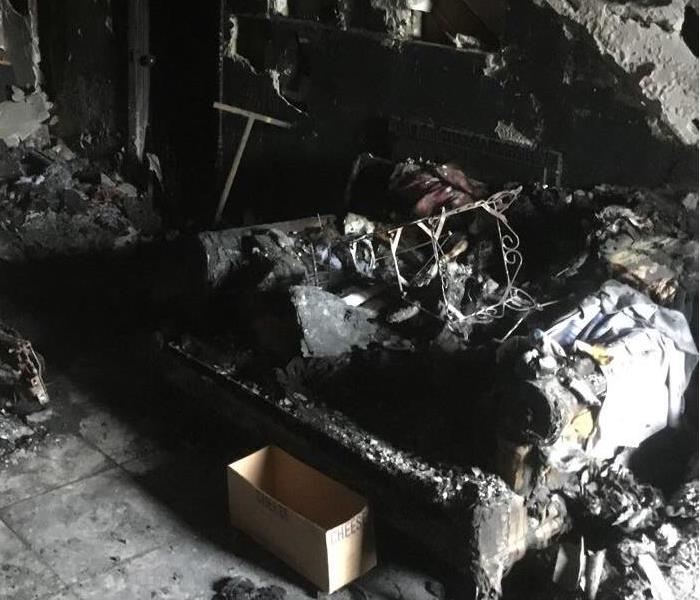 After math of an apartment fire in Pocatello, Idaho.
After math of an apartment fire in Pocatello, Idaho.
A recent report from the U.S. Fire Administration stated that home electrical fires claim the lives of around 280 Americans each year and can injure over 1,000.
Electrical fires occur most during the winter months due to the increased time spent indoors. With increased time inside the circuits and electrical cords can become overloaded and also increases the use of lighting, heating and appliances.
Many electrical fires can be avoided if basic safety precautions are taken. Please read the following safety tips:
- Routinely check your electrical appliance.
- Replace old wires.
- Replace electrical tools or appliance if it overheats, shorts out, causes even small electric shocks, or gives off smoke or sparks.
- Use electrical extension cords wisely; never overload extension cords or wall sockets.
Smoke Damage in Ducting System
4/16/2018 (Permalink)
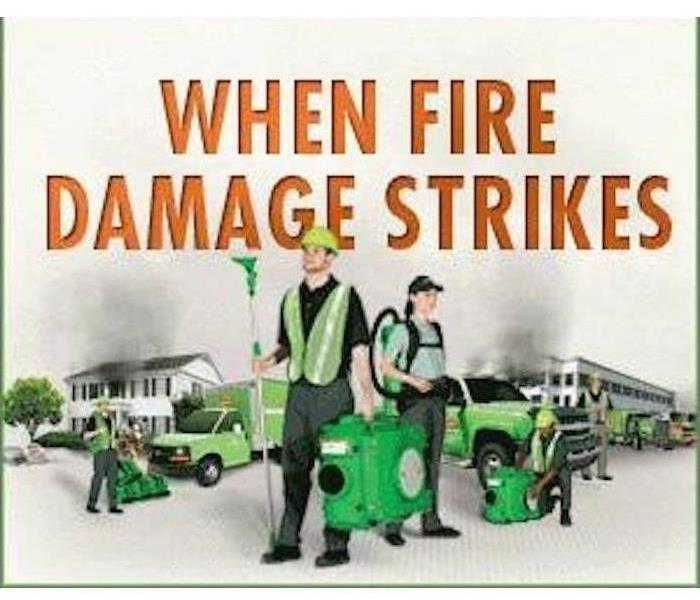 SERVPRO of Blackfoot/Pocatello is here to help in any emergency.
SERVPRO of Blackfoot/Pocatello is here to help in any emergency.
SERVPRO of Blackfoot/Pocatello has worked on commercial buildings and personal homes when it comes to fire damage.
Getting the smell of smoke out of any building regardless of the cause (for example grease fire or electrical) can be extremely challenging. It can require wide remediation to parts of the building that doesn’t seem to have any damage from the fire itself. However, in many causes a fire can cause smoke damage in the ducting of the building.
Once smoke permeates certain materials, getting the smell out permanently is impossible. Knowing the difference between what can be cleaned and what cannot be cleaned comes with training and experience and will save our clients thousands of dollars. SERVPRO invests a lot of time and money to ensure you have the best of both. If you had smoke damage to your commercial building or personal home, SERVPRO of Blackfoot/Pocatello is here to help. Call us today at 208.242.3819
Tips for Heating your Garage
1/10/2018 (Permalink)
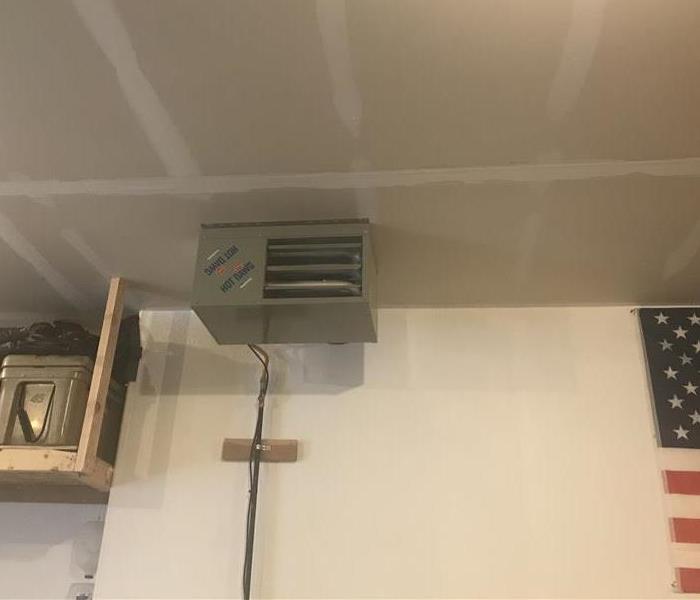 Heater inside our owner's garage.
Heater inside our owner's garage.
During the cold months here in Idaho, no one likes to walk out of the comfort of their warm home and into a cold garage. Last winter, our owner Tyler installed a mounted gas heater in his personal home (many other home owners and/or business owners have used space heaters as another option). The heather has made the space much more enjoyable to be in while working or just simply getting into your car. Even though heaters have many pros, there are a few cons; At times you can become anxious thinking the heater could catch fire.
Here are a few tips when having a space heater in your space:
- Do not leave space heaters unattended. If you are not going to be home or going to bed turn off the heater.
- Make sure the heater is in a proper area. Area that is staple and no chance of falling over.
- Be sure to check it surrounding areas, check for water or other close items that could cause a problem.



 24/7 Emergency Service
24/7 Emergency Service



























